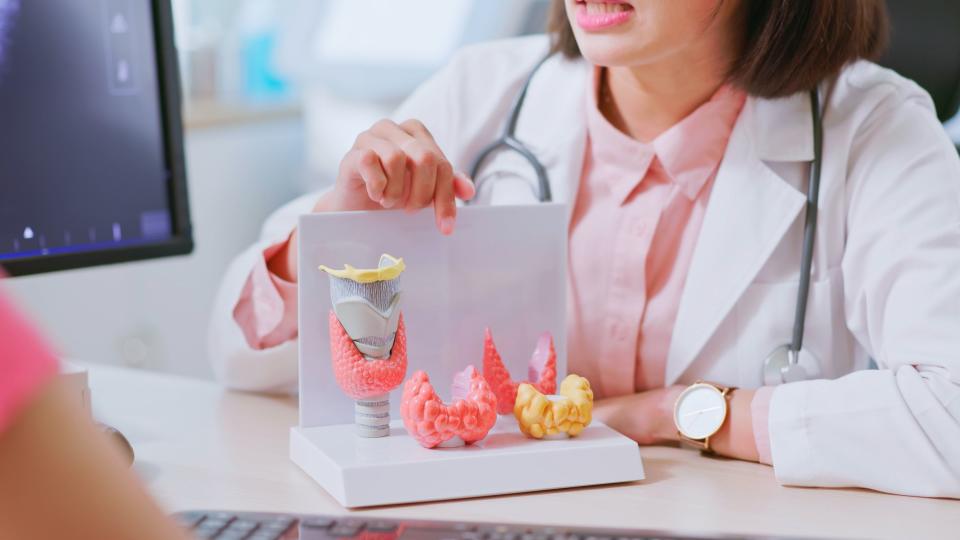Levothyroxine, a widely prescribed medication for hypothyroidism, is essential for managing thyroid hormone imbalances. However, new research indicates that its prolonged use may negatively affect bone health, particularly in older adults with normal thyroid hormone levels. This article explores the connection between levothyroxine use and bone mass loss, its implications for osteoporosis risk, and considerations for proper prescription practices.

What Is Levothyroxine and Why Is It Prescribed?
Levothyroxine is a synthetic form of thyroxine (T4), a hormone produced by the thyroid gland. It is primarily prescribed to treat hypothyroidism, a condition characterized by insufficient thyroid hormone production.
Role of the Thyroid Gland
The thyroid gland, located in the neck, plays a crucial role in regulating metabolism, growth, temperature control, and the functioning of the heart and digestive system.
- Key Hormones: Thyroxine (T4) and triiodothyronine (T3).
- Regulatory Mechanism: The pituitary gland produces thyroid-stimulating hormone (TSH), which signals the thyroid to release T3 and T4.
Common Symptoms of Thyroid Dysfunction
- Hypothyroidism: Fatigue, weight gain, cold sensitivity, dry skin, hair thinning, and depression.
- Hyperthyroidism: Weight loss, muscle weakness, high heart rate, anxiety, and irritability.
Recent Research on Levothyroxine and Bone Mass Loss
Study Overview
A study presented at the Annual Meeting of the Radiological Society of North America in November 2024 revealed that levothyroxine use could lead to reduced bone mass and density in older adults, even in individuals with normal thyroid hormone levels.
- Participants: 81 individuals aged 65 or older with typical thyrotropin (TSH) levels.
- Duration: Six years of follow-up.
- Findings: A decrease in total body bone mass and density among levothyroxine users compared to matched controls.
Implications for Bone Health
The study suggests that even when appropriately dosed, levothyroxine may have a negative impact on bone health in older adults.
- Bone Density Reduction: Associated with a higher risk of osteoporosis.
- Potential Mechanism: Increased bone turnover due to excessive thyroid hormone activity, even within normal ranges.
Is Levothyroxine Overprescribed?
Concerns About Overdiagnosis
Questions have been raised about whether levothyroxine is overprescribed, particularly for older adults with subclinical hypothyroidism.
- Seasonal Variations in TSH: Research shows that TSH levels naturally fluctuate throughout the year, peaking in winter and declining in summer.
- Diagnostic Criteria: Elevated TSH with normal or slightly low T4 levels may lead to unnecessary treatment.
Deprescribing as an Option
In cases where patients experience adverse effects, such as bone loss, deprescribing levothyroxine under medical supervision may be a viable option.
How Levothyroxine May Impact Bone Health
Thyroid Hormones and Bone Metabolism
Thyroid hormones play a vital role in bone remodeling, a process involving the removal of old bone and the formation of new bone.
- Excessive Thyroid Activity: Even mild over-replacement of thyroid hormones can accelerate bone resorption, weakening bones over time.
Effects on Older Adults
Older adults are particularly vulnerable to the bone-depleting effects of levothyroxine due to:
- Natural Bone Loss: Age-related reduction in bone density.
- Concurrent Health Conditions: Osteoporosis or other metabolic disorders.
What Can Be Done to Mitigate Risks?
Proper Monitoring and Prescription
- TSH Target Range: Ensure levothyroxine dosage maintains TSH levels within the optimal range for the patient’s age and health status.
- Regular Bone Density Scans: Use tools like Dual-Energy X-ray Absorptiometry (DEXA) to monitor bone health in older adults on long-term levothyroxine.
Lifestyle Modifications
Patients can take proactive steps to support bone health while managing hypothyroidism:
- Diet: Incorporate calcium and vitamin D-rich foods, such as dairy, leafy greens, and fortified products.
- Exercise: Weight-bearing and resistance exercises can strengthen bones.
- Avoid Smoking and Excessive Alcohol: Both habits contribute to bone loss.
FAQs About Levothyroxine and Bone Health
1. Can levothyroxine cause bone loss in everyone?
No, levothyroxine’s impact on bone mass is most significant in older adults, particularly those on long-term treatment with normal thyroid hormone levels.
2. How can I know if my levothyroxine dosage is safe for my bones?
Work closely with your doctor to monitor your TSH levels and undergo regular bone density tests if you’re at risk for osteoporosis.
3. Is it safe to stop taking levothyroxine if I’m worried about bone health?
Never stop taking levothyroxine without consulting your doctor. Sudden discontinuation can lead to severe hypothyroidism and other health complications.
4. Are there alternatives to levothyroxine for hypothyroidism treatment?
Levothyroxine is the most commonly prescribed treatment, but alternatives like desiccated thyroid extract exist. Discuss options with your doctor.
5. What can I do to protect my bones while on levothyroxine?
Focus on a bone-friendly diet, engage in regular exercise, and avoid smoking and excessive alcohol. Regular medical check-ups are also essential.




